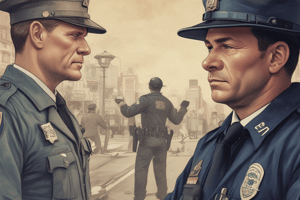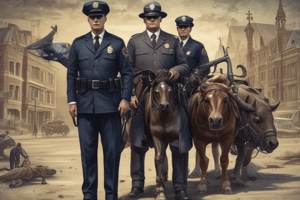Podcast
Questions and Answers
Which of the following is NOT a characteristic of a profession according to the text?
Which of the following is NOT a characteristic of a profession according to the text?
- Members possess a specialized body of knowledge.
- Members are required to have a college degree. (correct)
- Members share a commitment to serving the public.
- Members share a commitment to promoting the common good.
Which of the following is NOT a criterion for a profession as discussed in the text?
Which of the following is NOT a criterion for a profession as discussed in the text?
- Commitment to serving the public.
- Formal certification by a professional organization. (correct)
- Specialized body of knowledge.
- Commitment to promoting the common good.
What is the earliest meaning of "profession" as discussed in the text?
What is the earliest meaning of "profession" as discussed in the text?
- A profession requiring mental rather than manual labor.
- A vocation in which professed knowledge is used to serve others.
- A trade or handicraft requiring skill and training.
- A commitment to a spiritual order. (correct)
What is the primary difference between a profession and a trade?
What is the primary difference between a profession and a trade?
Why are law enforcement officers considered professionals?
Why are law enforcement officers considered professionals?
How does the text define a "professional"?
How does the text define a "professional"?
Why are law enforcement officers NOT typically considered professionals under the secular definition?
Why are law enforcement officers NOT typically considered professionals under the secular definition?
What is the primary focus of the text?
What is the primary focus of the text?
What is a potential consequence when law enforcement officers do not hold themselves to the same moral standards as the public?
What is a potential consequence when law enforcement officers do not hold themselves to the same moral standards as the public?
Which stage of an officer's career is characterized by high expectations and a naïve confidence?
Which stage of an officer's career is characterized by high expectations and a naïve confidence?
What is a significant factor that can predict unethical actions among officers?
What is a significant factor that can predict unethical actions among officers?
During which stage does an officer begin to confront reality, leading to feelings of frustration?
During which stage does an officer begin to confront reality, leading to feelings of frustration?
What can happen if officers experience negative peer pressure during their careers?
What can happen if officers experience negative peer pressure during their careers?
What attitude develops when officers start to feel overwhelmed by the reality of their job?
What attitude develops when officers start to feel overwhelmed by the reality of their job?
What is typically a consequence of defiance in an officer's career stage?
What is typically a consequence of defiance in an officer's career stage?
Which of the following is NOT mentioned as a negative effect of attitudes and actions misaligned with moral standards?
Which of the following is NOT mentioned as a negative effect of attitudes and actions misaligned with moral standards?
What is an example of moral courage for peace officers?
What is an example of moral courage for peace officers?
Which chapter of the Texas Penal Code addresses offenses against public administration?
Which chapter of the Texas Penal Code addresses offenses against public administration?
What does Title 8 of the Texas Penal Code focus on?
What does Title 8 of the Texas Penal Code focus on?
What is the consequence of unethical conduct by peace officers under federal law?
What is the consequence of unethical conduct by peace officers under federal law?
Which of the following is NOT an example of personal integrity for law enforcement officers?
Which of the following is NOT an example of personal integrity for law enforcement officers?
What is 'Improper Influence' according to the Texas Penal Code?
What is 'Improper Influence' according to the Texas Penal Code?
What constitutes 'Obstruction or Retaliation' under the Texas Penal Code?
What constitutes 'Obstruction or Retaliation' under the Texas Penal Code?
What should officers do when they witness unethical behavior?
What should officers do when they witness unethical behavior?
What is the ethical dilemma when discovering drugs in a drawer?
What is the ethical dilemma when discovering drugs in a drawer?
What should be a police officer's response upon realizing a colleague has a drinking problem?
What should be a police officer's response upon realizing a colleague has a drinking problem?
What is the ethical dilemma when an F.T.O. is not responding to calls?
What is the ethical dilemma when an F.T.O. is not responding to calls?
Which action reflects ethical behavior when encountering underage drinking?
Which action reflects ethical behavior when encountering underage drinking?
Which principle is central to the Law Enforcement Code of Ethics?
Which principle is central to the Law Enforcement Code of Ethics?
What action should an officer take if they witness a colleague breaking the law?
What action should an officer take if they witness a colleague breaking the law?
Which statement aligns with maintaining professional conduct as a law enforcement officer?
Which statement aligns with maintaining professional conduct as a law enforcement officer?
What is a vital consideration for officers when dealing with confidential information?
What is a vital consideration for officers when dealing with confidential information?
What is a primary expectation of police officers in relation to community engagement?
What is a primary expectation of police officers in relation to community engagement?
Which of the following is NOT a potential outcome of unethical behavior by police officers?
Which of the following is NOT a potential outcome of unethical behavior by police officers?
How should police officers ideally respond to conduct expected by personal relationships with community members?
How should police officers ideally respond to conduct expected by personal relationships with community members?
What is an essential component of mutual respect among criminal justice personnel?
What is an essential component of mutual respect among criminal justice personnel?
When should a police officer include a confession obtained without proper advising of rights in a report?
When should a police officer include a confession obtained without proper advising of rights in a report?
Which scenario would most likely challenge the integrity of police officers?
Which scenario would most likely challenge the integrity of police officers?
What overall goal does achieving ethical behavior in law enforcement aim to produce?
What overall goal does achieving ethical behavior in law enforcement aim to produce?
Which action exemplifies a violation of ethical conduct for police officers?
Which action exemplifies a violation of ethical conduct for police officers?
What is the primary purpose of the FBI's control over investigations into peace officers?
What is the primary purpose of the FBI's control over investigations into peace officers?
According to 18 USC 241, what consequence can be faced if two or more persons conspire to deprive someone of their rights?
According to 18 USC 241, what consequence can be faced if two or more persons conspire to deprive someone of their rights?
What is the maximum fine a person could face under 18 USC 242 for willfully depriving someone of their rights?
What is the maximum fine a person could face under 18 USC 242 for willfully depriving someone of their rights?
What is one of the key differences stated in 18 USC 242 regarding the treatment of inhabitants?
What is one of the key differences stated in 18 USC 242 regarding the treatment of inhabitants?
According to the content provided, who is held accountable for his or her conduct at all times?
According to the content provided, who is held accountable for his or her conduct at all times?
Which of the following is NOT a potential outcome if death results from a violation of 18 USC 241?
Which of the following is NOT a potential outcome if death results from a violation of 18 USC 241?
What is the intent behind 18 USC 241 concerning the actions of individuals?
What is the intent behind 18 USC 241 concerning the actions of individuals?
What might be a reason for including the details of separate federal and civil penalties in peace officers' conduct regulations?
What might be a reason for including the details of separate federal and civil penalties in peace officers' conduct regulations?
Flashcards
Professionalism
Professionalism
The conduct, aims, or qualities that characterize a profession or professional person.
Definition of Profession
Definition of Profession
An occupation skilled in and followed as a vocation, often requiring advanced training.
Secularization of Professionalism
Secularization of Professionalism
The transition of the term professionalism from religious vows to general occupations.
Learned Professions
Learned Professions
Signup and view all the flashcards
Specialized Knowledge
Specialized Knowledge
Signup and view all the flashcards
Public Service Commitment
Public Service Commitment
Signup and view all the flashcards
Law Enforcement as a Profession
Law Enforcement as a Profession
Signup and view all the flashcards
Common Good
Common Good
Signup and view all the flashcards
Accountability in Law Enforcement
Accountability in Law Enforcement
Signup and view all the flashcards
Impact of Officer Attitudes
Impact of Officer Attitudes
Signup and view all the flashcards
Idealistic Stage
Idealistic Stage
Signup and view all the flashcards
Frustrated Stage
Frustrated Stage
Signup and view all the flashcards
Defiant Stage
Defiant Stage
Signup and view all the flashcards
Peer Pressure in Law Enforcement
Peer Pressure in Law Enforcement
Signup and view all the flashcards
Legitimacy of Law Enforcement
Legitimacy of Law Enforcement
Signup and view all the flashcards
Ethical Behavior
Ethical Behavior
Signup and view all the flashcards
Moral Courage
Moral Courage
Signup and view all the flashcards
Duty to Intervene
Duty to Intervene
Signup and view all the flashcards
Chapter 36: Bribery
Chapter 36: Bribery
Signup and view all the flashcards
Perjury
Perjury
Signup and view all the flashcards
Abuse of Official Capacity
Abuse of Official Capacity
Signup and view all the flashcards
Official Oppression
Official Oppression
Signup and view all the flashcards
Federal Criminal Law
Federal Criminal Law
Signup and view all the flashcards
Tampering with Evidence
Tampering with Evidence
Signup and view all the flashcards
Impartiality in Law Enforcement
Impartiality in Law Enforcement
Signup and view all the flashcards
Ethical Behavior Outcomes
Ethical Behavior Outcomes
Signup and view all the flashcards
Unethical Behavior Outcomes
Unethical Behavior Outcomes
Signup and view all the flashcards
Traffic Citations Among Officers
Traffic Citations Among Officers
Signup and view all the flashcards
Mutual Respect in Criminal Justice
Mutual Respect in Criminal Justice
Signup and view all the flashcards
Advising Rights
Advising Rights
Signup and view all the flashcards
Community Focus
Community Focus
Signup and view all the flashcards
Continuous Ethical Awareness
Continuous Ethical Awareness
Signup and view all the flashcards
Ethical Dilemma
Ethical Dilemma
Signup and view all the flashcards
Alternatives in Ethics
Alternatives in Ethics
Signup and view all the flashcards
Community Service in Law Enforcement
Community Service in Law Enforcement
Signup and view all the flashcards
Confidentiality in Law Enforcement
Confidentiality in Law Enforcement
Signup and view all the flashcards
Code of Ethics
Code of Ethics
Signup and view all the flashcards
Courageous Calm
Courageous Calm
Signup and view all the flashcards
Self-Restraint
Self-Restraint
Signup and view all the flashcards
Welfare of Others
Welfare of Others
Signup and view all the flashcards
Civil Rights Violations
Civil Rights Violations
Signup and view all the flashcards
FBI's Role
FBI's Role
Signup and view all the flashcards
18 USC 241
18 USC 241
Signup and view all the flashcards
Penalties for 18 USC 241
Penalties for 18 USC 241
Signup and view all the flashcards
18 USC 242
18 USC 242
Signup and view all the flashcards
Penalties for 18 USC 242
Penalties for 18 USC 242
Signup and view all the flashcards
Officer Accountability
Officer Accountability
Signup and view all the flashcards
Civil Penalties for Misconduct
Civil Penalties for Misconduct
Signup and view all the flashcards
Study Notes
Understanding Professionalism in Law Enforcement
- Professionalism's earliest meaning stemmed from religious vows, evolving into secularized academic and vocational expertise.
- Varying definitions exist; early definitions tied it to a skilled profession (e.g., divinity, law, medicine, and military); more modern definitions see it as a vocation superior to trade, demanding advanced training in a liberal art or science (often involving mental work).
- Professionals possess highly specialized knowledge acquired through training and education.
- Professionals are committed to serving a public.
- Professionals share a commitment to promote the common good.
- Professionals adhere to a rigorous professional code of ethics exceeding norms of other vocations.
- Law enforcement officers meet all criteria for a profession, demonstrating specialized knowledge, public service, commitment to the common good, and a strict code of ethics.
Characteristics of Professionalism
- Service to others, assessment of their needs and knowledge acquisition through pre-service education.
- Standards for conduct, professional association, continual education and learning/lifelong learning
- Police legitimacy and procedural justice, meaning trust and confidence from the public.
- Accepting authority, fair treatment, respectful treatment (considering the facts, not social factors), and provision of ways for people to voice their concerns.
Police Legitimacy and Procedural Justice
- Fairness through consistency in rule application and process.
- Voice for all parties and the opportunity for all voices to be heard and considered, not disregarded.
- Transparency in processes
- Impartiality based on evidence, not biased interpretations.
Lecture Scenarios
- Professionalism in law enforcement, legitimacy, procedural justice, and relevant ethical questions.
- Advantages and disadvantages of professionalism, the law enforcement profession enhanced and/or compromised through interactions.
Law Enforcement Codes of Ethics
- The International Association of Chiefs of Police Code of Ethics emphasizes community service and respecting constitutional rights.
- Officers uphold a high standard of ethical behavior even away from work.
- Ethics are a critical component of professionalism.
- There are several important characteristics to have to maintain professionalism in many settings (e.g., in the field, at events).
- Values, moral principles, and ethics all play a role in maintaining professionalism.
- How an ethical situation is handled, can affect community trust.
- Relevant case studies, professional/unethical conduct, and their effects on community relations are discussed.
- Ethical behavior in different attitudes, including idealism, frustration, defiance, resignation, and commitment, are presented.
- The importance of being objective and free of personal bias is crucial.
Ethical Dilemmas in Law Enforcement
- Ethical dilemmas stem from competing values and the need for ethical decision-making models.
- Values, morals, and ethics in law enforcement (their current implications and needed change), are key factors.
- The relationships between people are important for effective ethics.
Professionalism and Ethical Relationships
- Varying priorities and values can complicate relationships between law enforcement professionals and public members.
- Maintaining ethical conduct is integral for maintaining trust and legitimacy.
- Professionalism involves objective and unbiased decision-making and responding to the public.
Relevant Legal Issues (Texas Penal Code, Federal Law)
- Specific chapters of the Texas Penal Code relate to bribery, obstruction, abuse of office, perjury, and other legal issues of potential concern.
- Federal laws (18 USC 241/242) regarding deprivation of rights, protect the rights of inhabitants from discrimination.
- Various federal laws and criminal procedure codes are relevant to certain instances of an officer's behavior.
- Discussing related legislation (for example, Texas Penal Code, Title 8, chapter-by-chapter) in context with ethics, law enforcement officers' behavior, and societal implications.
Private Conduct and Public Trust
- Officers must present a model of upright moral character.
- Accepting gifts, favors, or gratuities can undermine public trust.
- Officers should exhibit impartiality and avoid biased decisions, or actions.
Practical Scenarios
- Various scenarios (e.g., speeding tickets, accepting gifts, drug cases, ethical dilemmas with peers, etc.) examining the principles and ethical dilemmas in law enforcement.
Studying That Suits You
Use AI to generate personalized quizzes and flashcards to suit your learning preferences.




